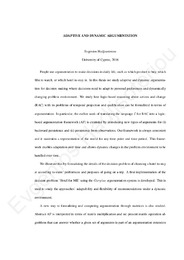Adaptive and dynamic argumentation

Date
2016-08Author
Hadjisoteriou, Evgenios G.Publisher
Πανεπιστήμιο Κύπρου, Σχολή Θετικών και Εφαρμοσμένων Επιστημών / University of Cyprus, Faculty of Pure and Applied SciencesPlace of publication
ΚύπροςCyprus
Google Scholar check
Keyword(s):
Metadata
Show full item recordAbstract
Σε αυτή την εργασία μελετάμε την προσαρμοστική και δυναμική επιχειρηματολογία για τη λήψη αποφάσεων, όπου οι αποφάσεις πρέπει να προσαρμοστούν στις προσωπικές προτιμήσεις και το δυναμικά μεταβαλλόμενο κόσμο. Μελετάμε πώς η κάθε δράση που μπορεί να επιφέρει αλλαγή, μπορεί να χρησιμοποιηθεί για να υποστηρίξει μια δυναμική απόφαση. Ειδικότερα, επεκτείνουμε τη προηγούμενη δουλειά της γλώσσας Ε και την ενσωματώνουμε σε ενα σύστημα επιχειρηματολογίας που δημιουργήσαμε. Ο τρόπος επέκτασης γίνετε με την εισαγωγή νέων τύπων επιχειρημάτων (i) προς τα πίσω και (ii) εισαγωγή παρατηρήσεων. Αυτό το πλαίσιο επιτρέπει την προσαρμογή με την πάροδο του χρόνου και επιτρέπει δυναμικές αλλαγές. Επιπλέον δημιουργήσαμε ενα σύστημα που επιλέγει ένα ξενοδοχείο για να μείνει ο χρήστης, σύμφωνα με τις προτιμήσεις και τους λόγους που ταξιδεύει.
Ένας νέος τρόπος για λήπση αποφάσεων με χρήση μαθηματικών πινάκων εχει επίσης μελετηθεί. Με βάση μαθηματικών πολλαπλασιασμών, παρουσιάζουμε αλγορίθμους που μπορεί να απαντήσουν κατά πόσον ένα δεδομένο σύνολο επιχειρημάτων αποτελεί μέρος μιας επέκτασης. People use argumentation to make decisions in daily life, such as which product to buy, which film to watch, or which hotel to stay in. In this thesis we study adaptive and dynamic argumentation for decision making where decisions need to adapt to personal preferences and dynamically changing problem environment. We study how logic-based reasoning about actions and change (RAC) with its problems of temporal projection and qualification can be formalized in terms of argumentation. In particular, the earlier work of translating the language E for RAC into a logic-based argumentation framework (AF) is extended by introducing new types of arguments for (i) backward persistence and (ii) persistence from observations. Our framework is always consistent and it maintains a representation of the world for any time point and time period. This framework enables adaptation over time and allows dynamic changes in the problem environment to be handled over time.
We illustrate this by formalizing the details of the decision problem of choosing a hotel to stay at according to users' preferences and purposes of going on a trip. A first implementation of the decision problem `Hotel for ME' using the $Gorgias$ argumentation system is developed. This is used to study the approaches' adaptability and flexibility of recommendations under a dynamic environment.
A new way to formalizing and computing argumentation through matrices is also studied. Abstract AF is interpreted in terms of matrix multiplication and we present matrix operation algorithms that can answer whether a given set of arguments is part of an argumentation extension under the various semantics of AF. This has been implemented in a program called ASSA that finds stable extensions and ASSAG that finds the grounded extension of any AF and allows the user to add or remove arguments or attacks while the application is running. The properties of dynamic argumentation are examined through empirical experiments using these systems.
